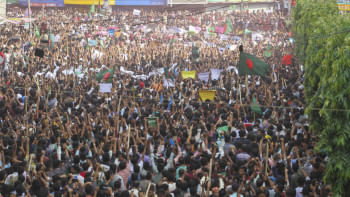Censorship: Who should it worry?

The 21st century has broadly been characterised as the Information Age. The rapid shift of centring the world and its economy around information technology in this Digital Age, rather than the traditional industries of the past, has led to an evolution in all societies—how humans organise themselves and their institutions—even though its effects are not yet fully understood because of the "time lag" factor.
What is understood is that the rate at which information can flow has never been faster. And that the amount of information that can travel across distances at this fast pace has never been greater. But what implications does this have on individual human beings?
As Elon Musk explained recently in an interview with Joe Rogan, an individual with a cell-phone connected to the internet today has far more information available to them than one without. And if that individual can transform that information into knowledge, more power—as knowledge equals power.
At a time when we have a chance to provide ever greater information to nearly all individuals on this planet and give them an opportunity to transform it into knowledge to become more powerful and independent, censorship, or attempts of censorship, are also increasing at an alarming rate. Though the forms of censorship, or attempts to censor, may vary, they all seem to have one common underlying ring to it: "We are doing this for your own good."
That is, with censors claiming to have the "moral high ground" for censoring information—claiming that their attempts to suppress information are based on "morality". Interestingly, just the other day, I was reading a book by Ayn Rand where she pointed out how immoral people (who have no moral code whatsoever) always use the moral code of good people against the latter—instead of facts or logic—to get their way, or to win arguments.
Returning to censorship… one of my favourite attempts to censor information was one that was actually attempted by a media outlet—namely CNN—where one of its anchors effectively said that because official US government documents published by Wikileaks—the only media outlet with 100 percent record for accuracy in reporting and to have won every court case since its inception—were classified, people should not read them. Instead, they should settle for CNN's explanation of what those documents contain.
Although it may be hard to believe that a media outlet, whose commodity of trade is information, would want to censor information, this is the same method that governments around the world often resort to. Think about it. What do governments do, exactly? They say that "we cannot provide any evidence for our claims (as it is classified for this or that reason), so people just need to take our word for it."
Anyone who refuses to simply accept the official narrative is then "named and shamed" and most often characterised as someone who is unpatriotic. And to do that the government needs no evidence or logic. No facts or critical thinking are required. All that is needed is for the government to claim to have the moral high ground, and to have an unthinking public to go along with it in a mad rush towards the imaginary high ground, lest they, too, be shamed.
Yet, as perhaps one of the greatest champions of freedom anywhere in the world in the last few decades, Dr Ron Paul, said, "Real patriotism is a willingness to challenge the government when it's wrong." Unfortunately, when you get stuck in a mud-slinging competition instead of engaging in critical thinking and factual arguments, it doesn't matter who is right and who is wrong. All that matters is who, in the loudest voice, claims to have the moral high ground.
And, naturally, the loudest voice in such circumstances will not be the ones who have the courage to stand on their own firmly beside their own principles. It will always be those who have none, and are simply willing to go along with the mob, which itself will dance to the tune of those who can best manipulate it.
Amidst such conditions, what those who support the free flow of information need to remember is that, "Censorship is always cause for celebration. It is always an opportunity because it reveals fear of reform. It means that the power position is so weak that you have got to care what people think," as Julian Assange explained. So, the only people who should be concerned about censorship are the censors themselves. As it is their weak positions of power that, in reality, are in danger, no matter how desperately they try to hide it. Which is why the only way they can maintain their power is to ensure everyone else remains weak—lack information that can give them power and independence.
But in the Digital Age that we live in today, it is nearly impossible to censor information fully, as long as there are those courageous enough to speak it. Does that mean that people who believe in the free flow of information should not fight censorship? Not at all.
However, what that also means is that they should remember to continue to speak their truths, instead of worrying all the time about censorship and whether their truths are being heard or believed. Because true to what St Augustine had said, "The truth is like a lion. You don't have to defend it. Let it loose. It will defend itself."
Eresh Omar Jamal is a member of the editorial team at The Daily Star. His Twitter handle is @EreshOmarJamal.






Comments